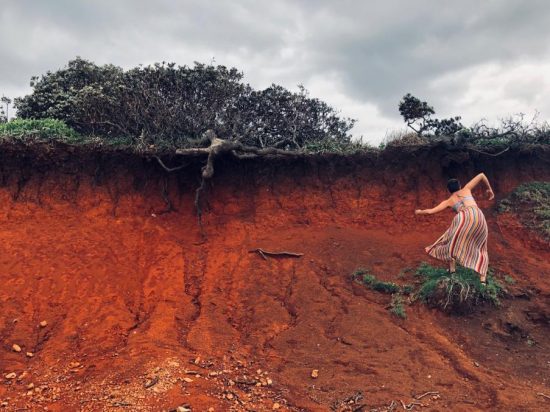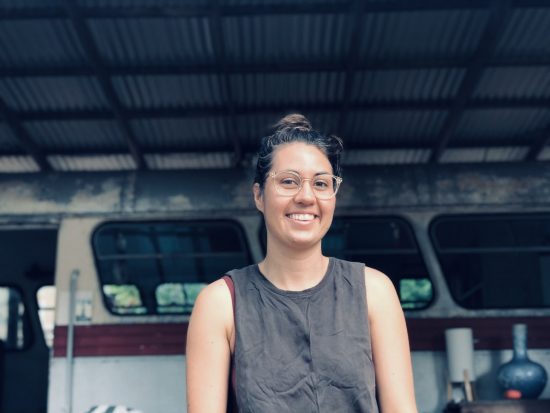How about this for a Cottonwood Institute connection? Tess Eckert took CAP at New Vista High School three times between 2007 and 2010 (tied for the all-time record, not that we’re counting). She got to learn from CI celebrities Ford Church and Paige Doughty. And after seven years in Australia, pursuing art, work, and exploration, she quickly found herself back in the CI community shortly after returning to Colorado. Tess now babysits for her former CAP instructor Paige and recently made a chance connection to current Field Instructor Seth Rose!
We caught up with Tess about her memories of three different seasons of CAP, her adventures around the world, and how she ended up back in the Cottonwood Institute orbit after her time away.
What CI program(s) did you take and when?
Like Leo Canner, Brittany Salley Rains, Brian Fauver and I’m sure a few others, I also took the CAP Program at New Vista High School three different times (the maximum limit, otherwise I’m sure I would’ve taken it more times) between 2007-2010. I had three different instructors, Ford, Rory, and Paige, and I took it in three different seasons, which gave me a nice diversity of experiences.
What do you remember most about your CI experience?
In Autumn CAP, most memorable was the moment that a small black coal that me and two peers worked tirelessly for at least an hour to create with our bow drill, fell delicately into our nest of kindling, igniting a fire. Palms blistering, sweat on our faces, we were filled with so much dopamine and glee from our accomplishment and teamwork of making fire without the help of paper or matches! Developing this survival skill was incredibly empowering and gave me a deep appreciation for the hard work and patience required to survive in the wilderness without many supplies. It also fostered in me a profound sense of respect for the elements—namely of fire; to become consciously aware of how for time immemorial fire has brought people from all backgrounds together, bringing warmth, light, and nourishment and how essential it is in the regeneration and balance of ecosystems and their biodiversity. In Winter CAP, I remember building a snow shelter that we all huddled in to warm ourselves, and cutting down beetle-kill trees for fire mitigation.
What are you up to these days? How have you stayed connected with the CI community?
I just moved back to Colorado after 7 years spent living and working in the Byron Bay region/Bundjalung Nation in Australia. An undergrad degree in Global Studies with a focus on Indigenous Studies took me to Byron Bay for a semester, where I fell in love with the coastal rainforest, incredible surfing beaches, diverse wildlife, rich local Indigenous culture and history, and a fiercely caring and committed community with a longstanding track-record of environmental activism and world-heritage sites.
I predominately work as a youth mentor, programs coordinator, and independent dance artist. I’m currently doing a Masters of Expressive Arts Therapy and developing a workshop series in a range of cultures and diverse environments, called “Body Landscapes,” which uses creative movement, poetry, sound, visual arts, and story-telling to foster a deeper sense of belonging and healthier relationships between our inner and outer landscapes. As I land and reconnect with my roots in Boulder, I have serendipitously found myself work babysitting for Paige Doughty who was my CAP instructor, and through a recent connection with Seth Rose, who currently works with CI, I’ve been able to reconnect from the periphery with CI and hear how it continues to grow and positively impact all the lives, human and non-human, that it touches!

The philosophy of Leave No Trace—and how to practice this daily in all our diverse environments. How to listen to the Earth, observe it’s patterns and apply ecological concepts in my own life and relationships. The importance of good teamwork, sharing and being conscious of resource consumption. How to live in balance and reciprocity with the land.
Looking back now, how has your CI experience impacted you long term?
It developed in me an awareness, curiosity, and deeper relationship with the more than human world and what my role/responsibility is in sustaining the health of the ecosystem and how in turn the natural environment can sustain my physical, emotional and spiritual health. I learned how resilient and delicate our ecosystems are and to not take them for granted—that my health is dependent on the health of the environment and vice versa. This course shifted the way I walk and relate to land, Indigenous epistemologies and people, and gave me the skills and experience to work together with my peers to effect real tangible change in service of an environmental issue.
How has your CI experience helped you create positive change in your community?
In Spring CAP, I remember doing an Action Project on water quality/pollution in Boulder, where we took water samples along Boulder Creek and installed a tiled mosaic with the motto, “Keep it Clean, Cause We’re All Downstream,” which still exists and serves as a reminder to our community today to look after our delicate water systems and all the creatures it sustains. We took a complex issue, and found a simple, creative, and tangible way to address it and educate others in our community about it, which was super empowering. I believe CI sparked my leadership capacity and skills, which I now utilize in my role mentoring other youth to become change agents in their own communities and environments. It’s also inspired my creative arts practice, and I’m currently really excited about using dance and the arts as an avenue to investigate, come up with, and present solutions to environmental issues at the local and global level.
Based on your CI experience, what advice would you give to other students?
Take this program and soak it up as much as you can. Be patient with the challenges it offers and invite them as profound teachers. There is so much destruction of our earth, and abuse of its resources, and it is also incredibly resilient. This program offers an opportunity to move from despair and disconnection into inspired action. Sometimes it’s not until years later when we reflect on an experience that we realize the depth of its impact on our lives. I am incredibly grateful and humbled to see how much of an imprint and positive influence this program had on my life and I wish it was a required course in all schools!
To summarize what I gained from CI, I’ll end with one of my favorite quotes by Chief Seattle “Humankind has not woven the web of life, we are but one thread within it, whatever we do to the web we do to ourselves. All things are bound together. All things connect.”
Thank you to Tess Eckert for her contributions!
Get involved with our Cottonwood Institute alumni community!
- Follow us on Facebook, LinkedIn, and Instagram
- Join our Facebook CI Alumni group at: https://www.facebook.com/groups/49045662698/
- Send us your stories of what you have been up to since CI! Email us to get connected!


